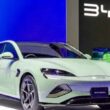Looking for the ideal family car options currently available? Whether you’re in search of a spacious SUV or a budget-friendly hatchback, our carefully curated list of the top 10 choices has you covered………….
Finding the perfect family car can be a bit of a challenge, especially considering that both adults and children demand a lot from their vehicles on a daily basis. The good news is that car manufacturers are rising to this challenge, providing a wide array of options for prospective family car buyers.
Family hatchbacks, for instance, deliver excellent fuel efficiency and ample space, all neatly packed into a compact design. The best ones in this category tend to strike a balance between various qualities, making them versatile choices. However, some buyers may require the additional roominess of an SUV or an estate. In such cases, you can expect more legroom for rear passengers, a larger cargo area, and enhanced comfort for long-distance journeys. Of course, these advantages may come with a slightly higher price tag and potentially reduced fuel efficiency.
For those seeking maximum interior space flexibility, MPVs with five or seven seats are the way to go. Nevertheless, the current trend in family cars leans heavily towards SUVs and crossover models, which offer a higher driving position and easier entry and exit thanks to their elevated ride height. Some of these models even boast mild off-road capabilities.
Our comprehensive list caters to a wide range of preferences, featuring SUVs like the Hyundai Tucson, more traditional MPVs like the Dacia Jogger, and even cutting-edge fully-electric options like the MG4. Whether you prioritize space, efficiency, or the latest technology, there’s a family car option for everyone on our list.
Best family cars to buy
- Dacia Jogger
- Honda Civic
- Peugeot 408
- Hyundai Kona Electric
- Hyundai Tucson
- Toyota Corolla Touring Sports
- Skoda Octavia
- MG4
- Cupra Born
- Citroen C5 X
- Dacia Jogger:
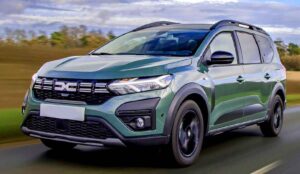
The Dacia Jogger is a standout choice with its seven-seat configuration, offering abundant space for both adults and children. With a cavernous cargo capacity of up to 1,807 litres and economical running costs, it’s no wonder that the Dacia Jogger clinched the coveted title of Family Car of the Year at our New Car Awards in both 2022 and 2023. What’s more, this exceptional family car starts at just a little over £18,000 and is currently offered with the added benefit of hybrid power.
The distinctive shape of the Jogger has always prioritized practicality over aesthetics. However, a recent facelift has injected a fresh and sharp look into its design. What truly enhances the Jogger’s versatile appeal is the ingeniously designed modular roof bars. Despite its boxy appearance, this design choice translates into surprisingly spacious third-row seats.
While the cabin design may appear simpler in comparison to its competitors, it is filled with considerate features that clearly indicate it was crafted with families in mind. You’ll still find all the usual creature comforts you’d expect. We particularly recommend opting for the mid-range Expression trim, which provides you with an eight-inch infotainment touchscreen, seamless connectivity through Apple CarPlay and Android Auto, parking sensors, climate control, and cleverly designed roof bars.
Honda Civic:
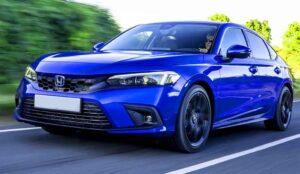
The 11th-generation Honda Civic follows a similar path to the Toyota Corolla, offering an exclusive self-charging hybrid powertrain. This powertrain excels in delivering a smooth, efficient performance, effortlessly achieving over 50 miles per gallon. The Civic’s design has also evolved, boasting a cleaner and more streamlined appearance, featuring a larger glasshouse for improved visibility and a sleeker overall profile. Undoubtedly, it stands out as an attractive family hatchback option.
Inside the Japanese hatchback, you’ll discover a remarkably spacious cabin that exudes solid craftsmanship. Notably, it showcases an advanced infotainment system that surpasses its predecessors. The latest Civic also outshines rivals such as the Volkswagen Golf and Ford Focus when it comes to luggage capacity, offering an impressive 410-litre boot.
The overall cabin ambience has taken a step up in luxury compared to the previous generation. In all models, the dashboard is dominated by a pair of 12.3-inch displays, providing a modern and sophisticated look. Hyundai’s latest infotainment software, featuring a cleaner interface with larger and more user-friendly ‘widgets,’ is integrated into the Kona.
- Peugeot 408:
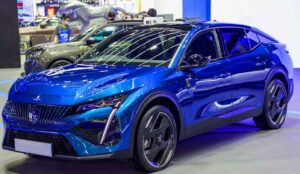
The Peugeot 408 is undoubtedly a stylish offering, particularly when it comes to the interior. Inside, it boasts premium materials and sharp digital displays that make it truly stand out. Remarkably, this style doesn’t compromise on substance.
The 408, classified as a coupe SUV, manages to maintain impressive practicality, thanks to its spacious boot and generous rear passenger area. In fact, it rivals even conventional mid-size SUVs in this regard.
The exterior design of the 408 leans towards the adventurous side, which might elicit mixed opinions. Similarly, the i-Cockpit setup, which encourages drivers to glance at the instrument display over a small steering wheel, can be a matter of personal preference. Nonetheless, the 408 remains a practical and comfortable car, though it may not fully deliver on the promise of its sporty design when it comes to handling. As you move up the trim level hierarchy and gain access to more of Peugeot’s coveted technology features, the 408’s appeal becomes even more compelling.
- Hyundai Kona Electric:
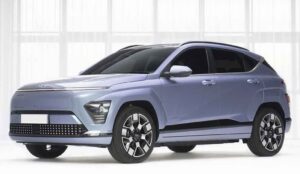
The Hyundai Kona Electric continues to hold its place as one of our top choices among electric vehicles. It offers spirited performance, a genuinely practical driving range, and a commendable blend of comfort and utility, making it a superb all-around option. In our view, the mid-level Premium model offers the most bang for your buck.
The Kona Electric stands out with its bold and distinctive appearance compared to many of its competitors. Craftsmanship is a strong suit, and it comes bundled with Hyundai’s exceptional five-year, unlimited mileage warranty, providing added peace of mind. For those not requiring an extensive range and seeking cost savings, there’s a version with a 39kWh battery.
However, our preferred choice is the 64kWh variant, boasting an impressive 300-mile range. If range anxiety has been a concern, the Kona Electric 64kWh could be the perfect solution. All Kona models are highly efficient, and our tests suggest that you’ll come closer to the official range figures compared to most rivals.
Hyundai has a track record of success with alternative fuel vehicles, as exemplified by the Ioniq hatchback competing with the Toyota Prius and becoming one of our favourite hybrids on the market. Moreover, the Ioniq 5 earned the title of our 2021 Car of the Year. The all-electric version of the Ioniq paved the way for Hyundai’s next generation of EVs, and the Kona Electric, released in mid-2019, brought practical electric power to the thriving small SUV segment.
- Hyundai Tucson:
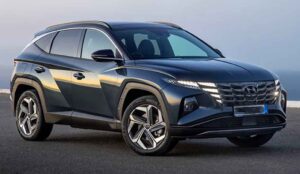
The fourth-generation Hyundai Tucson represents Hyundai’s ambitious foray into the fiercely competitive mid-size SUV segment, targeting more upscale rivals. Its striking and distinctive aesthetics, an abundance of standard features across the lineup, and an overarching sense of impeccable build quality have all contributed to the Tucson’s remarkable feat of winning the title of Mid-size SUV of the Year at our New Car Awards for three consecutive years.
For families, the Tucson proves to be an excellent choice, thanks to ingenious engineering that provides ample space for both front and rear passengers. Furthermore, there’s plenty of room for luggage, with an expansive 620-litre boot at your disposal.
Despite Hyundai’s efforts to infuse a premium feel into the Tucson, pricing remains reasonable. The base model, a petrol-powered Tucson in SE Connect trim, starts at just over £30,000 and includes a comprehensive suite of features such as forward collision-avoidance assist, Apple CarPlay and Android Auto compatibility, climate control, and parking sensors—all as standard, making it an attractive package.
- Toyota Corolla Touring Sports:
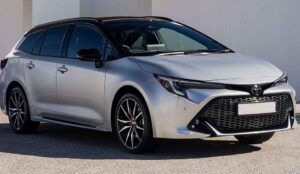
Our pick for Estate Car of the Year in 2023 is none other than the Toyota Corolla Touring Sports. This model recently underwent a facelift, which included the expected styling refinements. More significantly, it received enhancements to its hybrid system and introduced a fresh infotainment setup, elevating this already practical family wagon to new heights.
Both the Corolla hatchback and the Touring Sports estate are exclusively offered with a 2.0-litre petrol engine under the hood. However, our preference leans towards the 1.8-litre petrol variant. It delivers excellent performance while still achieving an impressive fuel economy of over 60 miles per gallon, and it offers a slightly roomier boot.
Surprisingly, the Corolla Touring Sports is quite enjoyable to drive, particularly for a car with an eco-friendly focus. Nevertheless, being an estate, practicality takes centre stage. It boasts a capacious boot with a capacity of up to 596 litres with all seats in their standard positions. The low, square load area further enhances its utility, making it a breeze to transport even the bulkiest cargo items.
- Skoda Octavia:
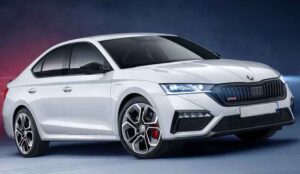
The Skoda Octavia is a standout all-rounder, ticking all the boxes when it comes to the essentials: competitive pricing, ample space and practicality, useful onboard technology, and a lineup of efficient petrol and diesel engines.
As you take a stroll around the Skoda family hatchback, its classy and sleek design immediately catches the eye. The interior quality is another strong point, easily rivalling more upscale competitors.
Remarkably, the Octavia offers excellent value with a starting price of under £25,000. The capacious 600-litre boot and generous passenger space create the feeling of driving a vehicle from a higher automotive class. We particularly appreciate the robust build quality of the Skoda Octavia, along with the comfort it offers and its ease of use for everyday driving.
- MG4:
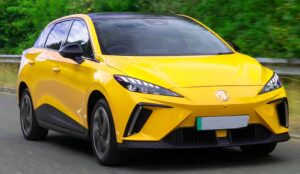
The MG4 is the latest addition to the brand’s lineup in the UK, and with a starting price of less than £27,000, it emerges as one of the most affordable electric cars currently available. Despite its budget-friendly nature, the MG4 presents a compelling alternative to well-established competitors like the Volkswagen ID.3 and Renault Megane E-Tech.
It offers similar levels of onboard technology and boasts impressive battery ranges of over 200 miles, along with the added benefit of a seven-year warranty.
The MG4 lineup comprises three versions: SE, SE Long Range, and Trophy Long Range. Both Long Range models feature a robust 64kWh battery, providing a commendable range of between 270 to 281 miles. The more affordable SE comes equipped with a slightly smaller 51kWh unit, still offering an impressive range of up to 218 miles on a single charge. Notably, all MG4 variants can be charged at speeds of up to 150kW, allowing for a 10 to 80 per cent battery top-up for the larger battery in just around 35 minutes.
- Cupra Born:
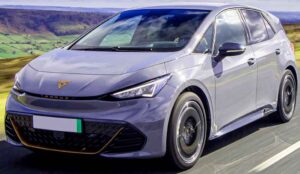
Hot hatches have long held a special place in the hearts of car enthusiasts, offering an enticing blend of driving excitement and practicality without breaking the bank. Traditionally, hot hatches have been powered by petrol engines, but Cupra’s inaugural electric vehicle, the Born, aims to shake up that tradition.
The Cupra Born shares several components with its counterpart, the Volkswagen ID.3, but it has been meticulously styled and tuned to become the more thrilling option of the two. Eye-catching features like copper-colored accents, alloy wheels, and striking LED lighting all contribute to the Born’s distinct and attention-grabbing appearance.
However, it’s not just about appearances, as the Born packs a punch when it comes to features. Standard equipment includes a generous 12-inch touchscreen with integrated sat-nav, wireless smartphone mirroring, a heated steering wheel, adaptive cruise control, and a handy reversing camera.
- Citroen C5 X:
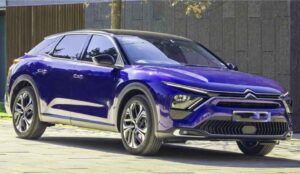
The Citroen C5 X continues the brand’s tradition of crafting distinctive and comfortable cruisers, and it follows this unique blueprint with flair. At first glance, it’s clear that the C5 X combines elements from luxury saloons, estates, and even SUVs, making it a standout presence on the road.
Depending on your chosen trim level, the C5 X offers a range of powertrains, including 1.2 and 1.6-litre petrol engines and a plug-in hybrid variant that provides an impressive electric range of up to 38 miles. Regardless of the model, Citroen’s Progressive Hydraulic Cushion suspension system ensures a refined and comfortable ride. The plug-in hybrid version gains an additional advantage with active suspension, which monitors the road ahead and adjusts the dampers accordingly for an even smoother ride.
Inside, you’ll be welcomed by a premium-feeling interior that boasts high-quality materials and plush, foam-filled seats. The SUV and estate influences pay off in terms of passenger space, providing ample room both in the front and rear. Additionally, the C5 X offers a capacious 545-litre boot, which slightly decreases to 485 litres in the PHEV variant, ensuring practicality for everyday use.
Selecting the ideal family car requires careful consideration of various criteria. To help you make an informed choice, we’ll address some of the most common questions that arise in the process:
Seating Capacity: Determine how many seats you need. While four or five seats may suffice for some families, larger families may require seven seats or even options with eight or nine seats. Explore dedicated pages for the best seven and eight-seater cars for more information.
Frequency of Seven-Seater Use: Consider how often you’ll actually use all seven seats. If a car offers both seven seats and a larger boot with five seats, the latter may be more practical if you won’t frequently utilize the third row.
Seat Room: Assess the space in the seats, especially if you have older children. Smaller seven-seaters might only provide sufficient room in the rear for small kids, potentially leaving teenagers feeling cramped. Keep in mind that kids grow, so long-term plans should account for their increasing size.
Frequency of Use: Consider how often the family car will be in use. If it’s primarily a weekend vehicle, you might be willing to accept higher running costs for the added space. Conversely, for daily school runs, a smaller car with useful features like parking sensors and cameras may be preferable.
Cargo Space: Evaluate your cargo space requirements. A conventional hatchback might suffice, but if you need more room, consider estate versions of hatchbacks or larger family cars available as estates. Crossovers and SUVs offer similar space, but their raised ride height may affect ease of loading.
Additional Equipment: Think about extra equipment needs. If you engage in outdoor activities, assess whether the car can accommodate items like bikes, skis, or a canoe. Check if the vehicle has roof rails and whether the roof is at a suitable height for easy item loading.
As you embark on your journey to find the ideal family car, rest assured that the 2023 lineup boasts a wide range of choices, each designed to make family life on the road comfortable, safe, and enjoyable. Whether you prioritize value, performance, or eco-friendliness, there’s a family car that’s ready to meet and exceed your expectations.
We hope our top 10 list has provided valuable insights and guidance to help you make an informed decision. No matter which family car you choose, may it bring joy and convenience to your family’s adventures throughout 2023 and beyond.




